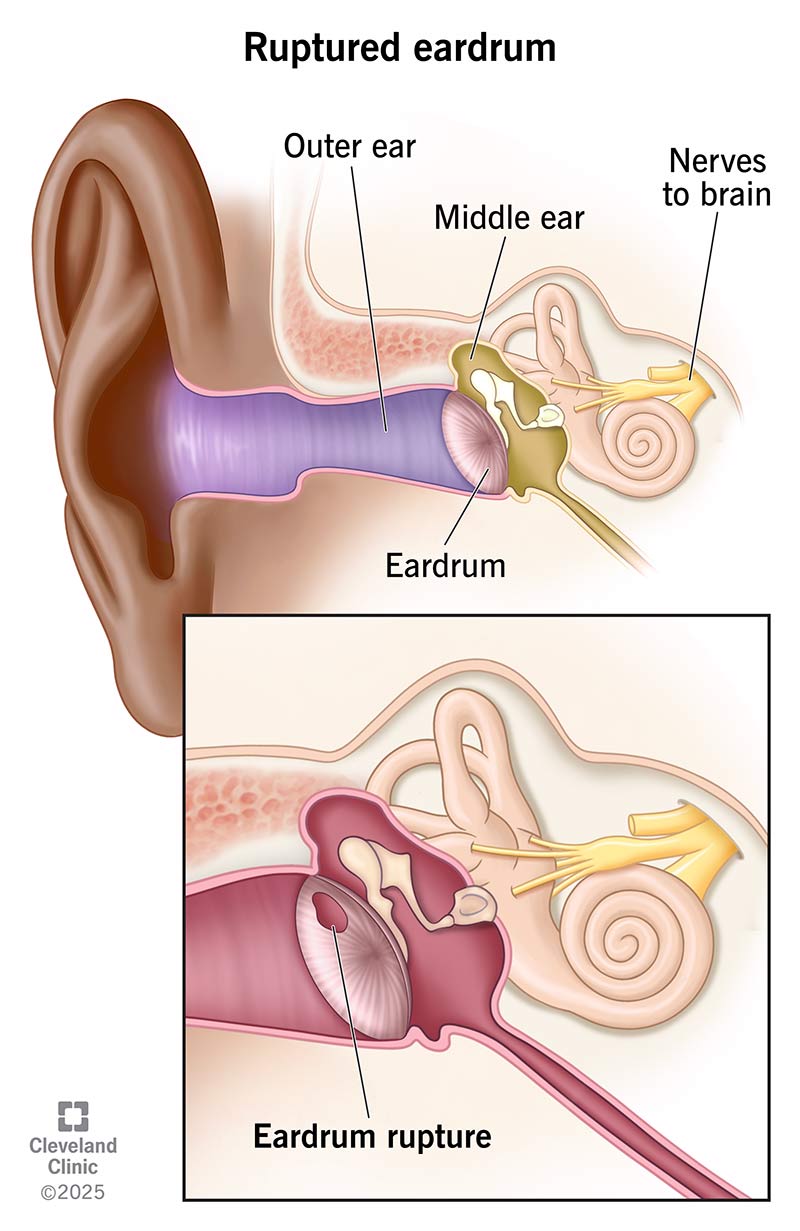A ruptured eardrum can happen from an infection or injury and may affect your hearing or balance. Most heal without treatment, but some need surgery. Protecting your ears is the best way to prevent it.
Advertisement
Cleveland Clinic is a non-profit academic medical center. Advertising on our site helps support our mission. We do not endorse non-Cleveland Clinic products or services. Policy

Image content: This image is available to view online.
View image online (https://my.clevelandclinic.org/-/scassets/Images/org/health/articles/15581-ruptured-eardrum)
A ruptured eardrum (also known as a perforated eardrum) is a hole or tear in the thin tissue that separates your outer ear from your middle ear. It can happen because of a bad ear infection or an injury to your ear.
Advertisement
Cleveland Clinic is a non-profit academic medical center. Advertising on our site helps support our mission. We do not endorse non-Cleveland Clinic products or services. Policy
A ruptured eardrum can affect your hearing or sense of balance. But in many cases, it heals on its own. Sometimes, you may need surgery to fix it. The best way to prevent it is to protect your ears from injury and infection.
If you think you’ve ruptured your eardrum, don’t panic — but don’t ignore it, either. Most tears heal with time, but some may need treatment.
You might not know your eardrum is ruptured right away, especially if nothing hit your ear. Many people notice changes in hearing or drainage from their ear as the first signs.
Common symptoms include:
If you notice any of these symptoms, it’s a good idea to get checked out. A ruptured eardrum usually heals on its own, but it’s best to let a provider confirm what’s going on.
The most common cause of a perforated eardrum is a middle ear infection. When fluid builds up behind your eardrum, it creates pressure that can make it tear or pop.
Advertisement
Other common causes include:
Protecting your ears is the best way to prevent a ruptured eardrum. Here are a few simple tips:
A ruptured eardrum is sometimes a serious issue, especially if it doesn’t heal on its own. Possible long-term complications include:
Your eardrum also acts as a barrier. When it’s torn, germs, water and debris can enter more easily and raise your risk of infection.
To check for a ruptured eardrum, your provider will look inside your ear with a tool called an otoscope. It shines a light into your ear so they can see your eardrum clearly.
You might also have hearing tests. These help measure how well your eardrum is working and how well you hear.
Common tests include:
These tests help your provider figure out if you have an eardrum rupture or another ear issue.
In many cases, a ruptured eardrum heals on its own without treatment. But if it doesn’t, you may need to see an ear, nose and throat specialist (ENT) for help.
Treatment options may include:
Advertisement
Most ruptured eardrums heal within a few weeks, but some may take a few months. Contact your healthcare provider if you still have pain, drainage or hearing problems. You might need more treatment.
Call your provider if your symptoms don’t improve within a few weeks, or if they get worse.
Go to the emergency room if:
Most ruptured eardrums heal on their own, but how you care for your ear can make a big difference. Here’s how to protect your ear while it heals:
If you have a ruptured eardrum, try sleeping on the side that doesn’t hurt or doesn’t have fluid coming out. This keeps pressure off the damaged ear.
Advertisement
Your eardrum is delicate — and essential. A rupture can affect your hearing and balance. It can also increase the risk of infection. That’s why protecting your ears matters. Most ruptured eardrums heal on their own, but healing takes time. If yours isn’t getting better, reach out to your provider. You may need treatment to help it heal fully.
Advertisement

Sign up for our Health Essentials emails for expert guidance on nutrition, fitness, sleep, skin care and more.
Learn more about the Health Library and our editorial process.
Cleveland Clinic’s health articles are based on evidence-backed information and review by medical professionals to ensure accuracy, reliability and up-to-date clinical standards.
Cleveland Clinic’s health articles are based on evidence-backed information and review by medical professionals to ensure accuracy, reliability and up-to-date clinical standards.
A ruptured eardrum is treatable. Cleveland Clinic’s head and neck providers have the personalized ear care you need.
